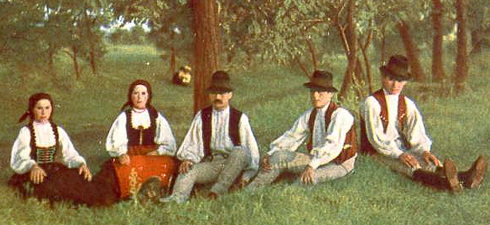In Transylvania, the road linking Brasov to Covasna is redolent with the aroma of Kurtos Kalacs (sweet buns sprinkled with caramelized sugar) and homemade potato bread. This is the historic route to the country of the Szeklers, Romania's ethnic Hungarian minority, whose National Council recently voted to adopt a national anthem, a coat of arms and a flag for the "future autonomous Szeklerland." Zagon, one of the largest villages in Covasna country has about 5,000 inhabitants, with approximately 2,700 Romanians, almost as many Hungarians and about 40 Roms. Politicians in Zagon are proud of the fact that the village is run by a multi-ethnic team with a Magyar mayor, Joseph Kis, and a Romanian deputy mayor, Nicolae Coznean. Both men have known each other since they shared the same bench in primary school. "I have lived here all my life, and we have never had any ethnic issues with the Magyars and the Gipsies," explains the deputy mayor. "I can honestly say that I don't understand this Szeklerland business. Not long ago, I was talking about what's been happening with a policeman from the Magyar community, and he asked me, 'If we do have an independent Szeklerland, does that mean that I will earn twice as much as my Romanian colleagues?'" Almost everyone in Zagon can speak Romanian and Hungarian, and fluency in both languages is virtual pre-requisite for local government jobs.
Debate focuses more on potatoes
On this typical September day, the streets are busy with carts and tractors loaded with potatoes, the principal product of the land that is the main source of income for most of the inhabitants of Zagon — and there is hardly any talk of politics in the village where conversation is invariably dominated by discussion of the potato crop and growing conditions. In the Romanian quarter, several men are working on the roof of a house, which will soon be home to young mixed couple: Sorina, a Romanian bride, and her Hungarian husband Gyusz Kertenz. "There is no problem when the husband is Hungarian and the wife is Romanian or vice versa. The people here have grown up together, so they can't hate each other — not like they claim on the TV," insists Gabriela Cretu, a former teacher in the village nursery school, who feels the calls for an independent Magyar community have been orchestrated by nationalists in Budapest.
On a bench close to the mayor's office, Tartoli Bila was sitting quietly in the shade. The 75-year-old who has always lived Zagon does not know what to make of the campaign for autonomy, which does not inspire his interest. He feels that the fields, where everyone does the same work and where he has spent most of his life, are no place for political disputes. "We all live here, and the Romanian girls marry the Magyar men, and the Romanian lads go after the Magyar girls. No one would worry about that, if it wasn't for the toffs on television. Whatever happens, I'll be out in the fields, or in the wood. And all I can say is, good luck to them!"
Independence for Szeklerland is impossible****
At his home in Covasna's Romanian quarter, which can be identified by an old election poster fluttering outside in the breeze, the chairman of the local branch of the National Liberal Party (NLP), Mugurel Grigorescu who works as building manager in Covasna, told us he wants to put "a spanner in the Hungarians' works" — but he does not feel he is involved in an ethnic dispute. "I have many Magyar friends," he said, "ordinary people who are too busy working the land. This question of independence for the Szeklers has been stirred up by a handful of politicians. They want their autonomy, let them have it. We can give them a bit of land somewhere. Let's see how they manage on the income they bring in — and without electricity too." Grigorescu is convinced that an independent Szeklerland is impossible: "You can't have a state within a state. In any case, you can't have an independent state without an independent economy. They depend on Romania for everything: for gas, for oil, and even for electricity."
For years, the leaders of the UDMR (the Democratic Union of Hungarians in Romania) has been campaigning for an autonomous Szekler territory, but the people of Zagon seem to be largely unaware of their existence. In all likelihood, this indifference is due to the fact that Romania's Hungarian minority already benefits from an extensive bill of rights which include state recognition of the Hungarian language — which allows Hungarian speakers to to use their native language in court, and enables their children to attend special Hungarian schools or Hungarian language classes in other schools — and state acknowledgement of the need to protect and promote Szekler culture, which encourages Hungarian language newspapers, and radio and TV stations — a provision also extends to national TV channels, which have special hours for Hungarian programming. It is the continuation of this policy that will probably ensure that Zagon will remain the sleepy village that it is today.
Was this article useful? If so we are delighted!
It is freely available because we believe that the right to free and independent information is essential for democracy. But this right is not guaranteed forever, and independence comes at a cost. We need your support in order to continue publishing independent, multilingual news for all Europeans.
Discover our subscription offers and their exclusive benefits and become a member of our community now!












